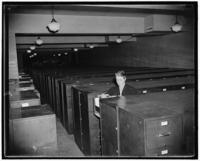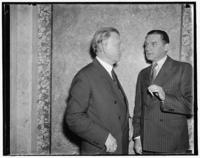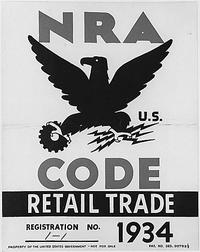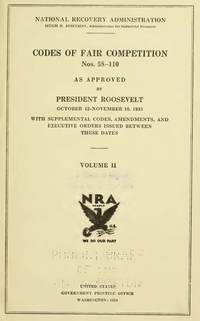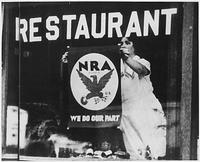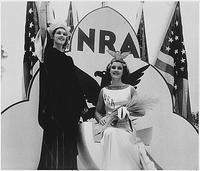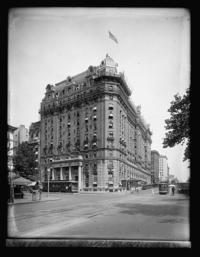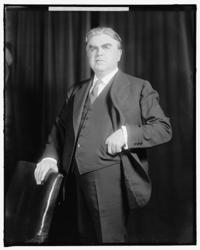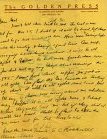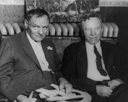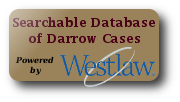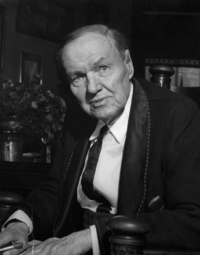National Recovery Review Board
"Like sentinels at a munition plant in wartime, guards stood watch before the locked doors of the printing office at the Department of Commerce for 18 hours one day last week. Behind the doors political dynamite was in manufacture, the long-awaited report by Clarence Darrow and his special board on the operations of NRA as they affected the small industrialist and businessman was being mimeographed. Also being mimeographed under guard were the dissenting report of John F. Sinclair of Manhattan, newspaper financial columnist and member of the Darrow Board, and the caustic retort of General Johnson. At the zero hour 150,000 words of controversy were dumped upon the public. Vitriolic bomb shells of recrimination burst in the camps of Johnson and Darrow while Sinclair's trench mortar added to the loud discord. By and large the U. S. took the bombardment without flinching." – Recovery: Darrow Report, TIME, May 28, 1934.
Lecture given by Lowell B. Mason about Clarence Darrow and the National Recovery Review Board. Mason worked with Clarence Darrow on this board. Courtesy of The University of Chicago Law School Record.
From the Internet Archive.
Codes of Fair Competition, Nos. 58 - 110, Volume 2 (1934).From the Internet Archive.
Codes of Fair Competition, Nos. 111-150, volume 3 (1934).This volume contains the code for the motion picture industry. The National Recovery Review Board, chaired by Clarence Darrow, received more complaints against the motion picture code than any other code they reviewed. The Board's report on the motion picture code was included in its first report. From the Internet Archive.
Codes of Fair Competition, Nos. 151-195, volume 4 (1934).From the Internet Archive.
Codes of Fair Competition, Nos. 196-244, volume 5 (1934).From the Internet Archive.
Codes of Fair Competition, Nos. 245-286, volume 6 (1934).From the Internet Archive.
Codes of Fair Competition, Nos. 287-329, volume 7 (1934).From the Internet Archive.
Clarence Darrow's Testimony before Senate Committee Investigating the National Recovery Administration.The controversy created by the National Recovery Administration and the National Recovery Review Board prompted the Senate to pass Resolution 79 under which the Senate Committee on Finance would undertake an investigation of the National Recovery Review Board. Clarence Darrow was called to testify on March 20, 1935.
Investigation of the National Recovery Administration: Hearings Before the Committee on Finance, Part 6.Part of the Senate Committee on Finance hearings held pursuant to Senate Resolution 79 to investigate the National Recovery Review Board. Part 6 covers April 13, 15, 16, 17 and 18, 1935 and contains the dissenting report of John F. Sinclair.
The notice also mentions Darrow has been lecturing on behalf of liquor dealers. From The Shop Review.
Photos - Key Figures

President Roosevelt appointed Hugh S. Johnson as Director of the National Recovery Administration (NRA). An important part of the NRA's responsibility was the creation and enforcement of "codes of fair competition" between various industries. But the codes and the NRA were heavily criticized. In response, in March 1934 President Roosevelt created the National Recovery Review Board to review the codes and report its findings to the president. Roosevelt picked Clarence Darrow to chair the board. But the Darrow board antagonized the Roosevelt administration with its critical reports and Darrow and Johnson publicly sparred.
Caption for photo: "Former NRW administrator urges independent course for United States abroad. Washington, D.C., April 24. Appearing as a witness before the Senate Foreign Relations Committee today, Gen. Hugh S. Johnson, former NRA administrator and now a newspaper columnist, urged an independent course for the U.S. abroad. He said only the safe course for this nation now was to rely upon its own strength."
Library of Congress Prints and Photographs Division, LC-DIG-hec-26545.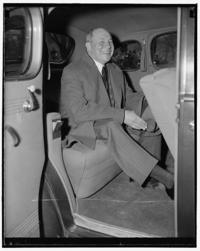
Donald Richberg, a key aide to President Roosevelt, helped write the National Industrial Recovery Act and he served as general counsel and executive director of the National Recovery Administration. Richberg had known Clarence Darrow for years and he recommended that Darrow be appointed to the National Recovery Review Board.
Caption for photo: "Former NRA coordinator discusses oil seizures with Roosevelt. Washington, D.C., April 18. Donald R. Richberg, former NRA coordinator and now an oil company negotiator in an attempt to straighten out the problems involved in the Mexican seizures of American oil properties. He said that his visit was only to make a routine report."
Library of Congress Prints and Photographs Division, LC-DIG-hec-26496.
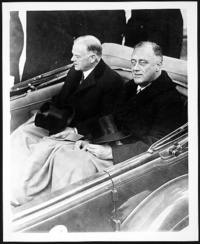
The National Recovery Review Board was established by President Franklin Roosevelt through Executive Order 6632 on March 7, 1934:
"By virtue of the authority vested in me under the provisions of Title I of the National Industrial Recovery Act of June 16, 1933 (ch. 90, 48 Stat. 195), and in order to effectuate the purposes of said Title, I hereby establish an organization which shall be known as the National Recovery Review Board.
The following persons are hereby appointed to serve as members of the said Board:
Clarence Darrow, Fred P. Mann, Sr. Samuel C. Henry
W. W. Neal, John F. Sinclair,
W.O. Thompson."
Clarence Darrow headed the Review Board in the last major activity of his professional life.
Library of Congress Prints and Photographs Division, LC-DIG-ppmsca-19179.
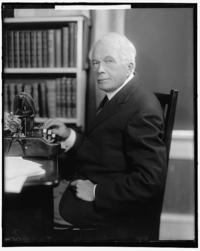
Charles Edward Russell (1860 - 1941) was a journalist, author, and activist. Born in Davenport, Iowa, he was the son of the abolitionist editor of the Davenport Gazette. He moved to Minneapolis in 1881 to write for the Minneapolis Journal which would later become part of the Star Tribune. During the next twenty years he worked for the Detroit Tribune, the New York World, the New York Herald and the Chicago Examiner. He was also a cofounder of the National Association for the Advancement of Colored People (NAACP) in 1909 and a member of the Socialist Party prior to World War I. Russell became one of the most prolific and controversial of the muckraking journalists. Russell won a Pulitzer Prize in 1928.
Clarence Darrow was good friends with Russell and brought him in to help Darrow conduct work on the National Recovery Review Board in 1934. The board was appointed by President Franklin Roosevelt to study the fair competition codes created by the National Recovery Administration.
Library of Congress Prints and Photographs Division, LC-DIG-hec-20122.Photos
